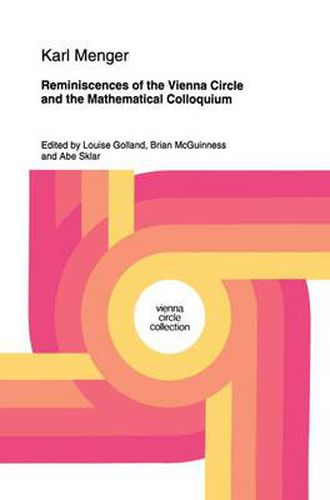Readings Newsletter
Become a Readings Member to make your shopping experience even easier.
Sign in or sign up for free!
You’re not far away from qualifying for FREE standard shipping within Australia
You’ve qualified for FREE standard shipping within Australia
The cart is loading…






This title is printed to order. This book may have been self-published. If so, we cannot guarantee the quality of the content. In the main most books will have gone through the editing process however some may not. We therefore suggest that you be aware of this before ordering this book. If in doubt check either the author or publisher’s details as we are unable to accept any returns unless they are faulty. Please contact us if you have any questions.
Karl Menger was born in Vienna on January 13, 1902, the only child of two gifted parents. His mother Hermione, nee Andermann (1870-1922), in addition to her musical abilities, wrote and published short stories and novelettes, while his father Carl (1840-1921) was the noted Austrian economist, one of the founders of marginal utility theory. A highly cultured man, and a liberal rationalist in the nine teenth century sense, the elder Menger had witnessed the defeat and humiliation of the old Austrian empire by Bismarck’s Prussia, and the subsequent establishment under Prussian leadership of a militaristic, mystically nationalistic, state-capitalist German empire - in effect, the first modern military-industrial complex.
These events helped frame in him a set of attitudes that he later transmitted to his son, and which included an appreciation of cultural attainments and tolerance and respect for cultural differences, com bined with a deep suspicion of rabid nationalism, particularly the German variety. Also a fascination with structure, whether artistic, scientific, philosophical, or theological, but a rejection of any aura of mysticism or mumbo-jumbo accompanying such structure. Thus the son remarked at least once that the archangels’ chant that begins the Prolog im Himmel in Goethe’s Faust was perhaps the most viii INTRODUCTION beautiful thing in the German language but of course it doesn’t mean anything.
$9.00 standard shipping within Australia
FREE standard shipping within Australia for orders over $100.00
Express & International shipping calculated at checkout
This title is printed to order. This book may have been self-published. If so, we cannot guarantee the quality of the content. In the main most books will have gone through the editing process however some may not. We therefore suggest that you be aware of this before ordering this book. If in doubt check either the author or publisher’s details as we are unable to accept any returns unless they are faulty. Please contact us if you have any questions.
Karl Menger was born in Vienna on January 13, 1902, the only child of two gifted parents. His mother Hermione, nee Andermann (1870-1922), in addition to her musical abilities, wrote and published short stories and novelettes, while his father Carl (1840-1921) was the noted Austrian economist, one of the founders of marginal utility theory. A highly cultured man, and a liberal rationalist in the nine teenth century sense, the elder Menger had witnessed the defeat and humiliation of the old Austrian empire by Bismarck’s Prussia, and the subsequent establishment under Prussian leadership of a militaristic, mystically nationalistic, state-capitalist German empire - in effect, the first modern military-industrial complex.
These events helped frame in him a set of attitudes that he later transmitted to his son, and which included an appreciation of cultural attainments and tolerance and respect for cultural differences, com bined with a deep suspicion of rabid nationalism, particularly the German variety. Also a fascination with structure, whether artistic, scientific, philosophical, or theological, but a rejection of any aura of mysticism or mumbo-jumbo accompanying such structure. Thus the son remarked at least once that the archangels’ chant that begins the Prolog im Himmel in Goethe’s Faust was perhaps the most viii INTRODUCTION beautiful thing in the German language but of course it doesn’t mean anything.